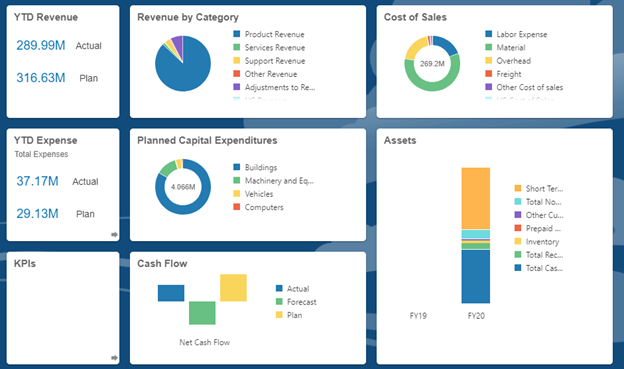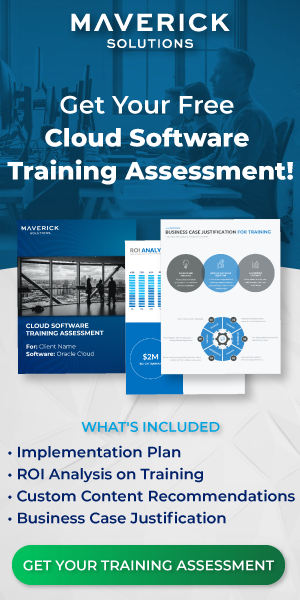What is Oracle EPM Cloud? EPM stands for Enterprise Performance Management. EPM is a separate cloud application from Oracle’s ERP (Enterprise Resource Planning) system.
Oracle ERP Cloud focuses on the following Oracle Cloud applications:
- Project Management
- Financials
- Supply Chain Management
- Risk Management
- Procurement
While Oracle EPM Cloud focuses on the following Oracle Cloud applications:
- Planning/Profitability and Cost Management
- Financial Consolidation and Close/ Account Reconciliation
- Tax/Narrative Reporting
- Enterprise Data Management
The two Oracle suites can be integrated so they “talk” to each other and share data between systems.
If EPM stand for Enterprise Performance Management….What is Enterprise EPM?
Oracle has two EPM offerings: Standard EPM and Enterprise EPM. Standard EPM is what we will be focusing on today as it is primarily for small and mid-sized businesses whose performance-management needs aren’t quite as complex as larger companies.
Standard EPM comes with the following business processes:
- Planning
- Financial Consolidation and Close
- Account Reconciliation
- Narrative Reporting
- Data Management
Note: Standard EPM does not come with Enterprise Data Management, Tax Reporting, or Profitability and Cost Management.
Let’s talk about Standard EPM and how it can be used to benefit your business.
How can I use the Oracle EPM Cloud system?
Knowing what Oracle EPM Cloud focuses on is helpful, but it does not necessarily answer why you need it. Enterprise Performance Management in its most basic form refers to the monitoring, analyzing, and management of an organization’s performance specifically by evaluating and allocating resources. EPM is generally the go-to resource for the Chief Financial Officer (CFO) or the finance department of an organization.
An ideal EPM solution allows the CFO to model and analyze what-if scenarios and simplify the financial auditing process.
The smallest of companies may use a simple Excel spreadsheet to achieve these functions; however, it is not long before the company is large enough that spreadsheets are cumbersome and unwieldy solutions for performance management. Additionally, spreadsheets can become a large security concern. Oracle EPM Cloud solves both issues.
One misconception is that Oracle EPM Cloud is only for big business when in reality Oracle has solutions for startups (which includes a 70% discount for the first two years) as well as small to medium businesses. Generally, an EPM solution is needed when the startup becomes a true small business.
Let’s dig deeper into what Oracle EPM Cloud can do for you.
We already listed above the areas Oracle EPM Cloud focuses on, but what do they do, and how can they help? Let’s look at them individually to show how they help your small business.
Oracle Planning Cloud (Formally referred to as EPBCS)
Oracle Planning Cloud within Oracle EPM Cloud includes planning and budgeting solutions, workforce planning solutions, and long-range planning solutions. The planning and budgeting functions are a direct replacement for spreadsheets. However, the planning and budgeting functions feature an increased flexibility and security the spreadsheets lacked. Workforce planning allows you to easily keep track of headcount and compensation as they relate to strategic objectives and available resources. Long-range planning is the “what-if” tool that allows you to model situations, plan for different outcomes, and test plans for weak points.
What does this look like? Oracle Planning Cloud includes a variety of configurable dashboards, infolets, and reports that provide snapshot views of any aspect of the business they are set to provide data for at any given time.
Companies commonly create dashboards that involve current models or forecasts for capital, financial projects, and workforce. The flexibility of available analytics is the true benefit for any business.
The following screenshot demonstrates an example of a dashboard within Oracle Planning Cloud:

Oracle Financial Consolidation and Close (FCCS) Cloud
Finances have a reputation of being a nightmare in the business world, but they do not have to be! Oracle EPM Cloud’s efficient financial close system is specifically designed to remove bottlenecks in the finance process and provide accurate data estimates at any point for use in planning. You can assign tasks, create dashboards, easily consolidate finances by utilizing the hierarchy system, manage key performance indicators, and even automate intercompany eliminations.
Once the accounts are consolidated, they go into the Account Reconciliation area of EPM where they are reconciled. You can set the system up to reconcile items automatically, with customized rules, any needed format, and with auto-matching.
Narrative Reporting
Have you ever had to collaborate on a report with someone at work and struggled to find the most efficient way to share data, co-write sections, and make sure everyone always has the most up-to-date version of the report? The Narrative Reporting area of Oracle EPM Cloud solves these problems. You can include multiple report authors, manage reviews, access source data directly to easily combine data and report content, securely transfer reports to stakeholders, and use pre-formed regulatory templates. Already have templates? You can import those directly in as well.
Data Management
All of Oracle EPM Cloud relies on data, so it is helpful to have an entire area of EPM dedicated to management. What can you do with data management? You can connect Oracle EPM Cloud to any business application (usually an ERP system), import data from the connect applications, validate data quality, synchronize data across applications, collaborate on data editing, create visuals, export, automate, and download data.
That is a long list, so to make it simpler, get data, edit data, view data, send data.
And that is a very basic overview of EPM!
So, why should small businesses use Oracle EPM Cloud solutions?
In short, because it makes business life easier by providing a consolidated, flexible solution for all your planning, financial, and data management needs in a secure and integrated environment. Many systems can provide a few of these solutions, but an EPM system provides them all.
In 2019, Oracle performed a survey of their customers that adopted their EPM Cloud and found that 75% saw beneficial results within the first six months including:
- Reducing planning time
- Reducing spreadsheets
- Increased ability to scale for growth
- Overall improved communication
A common consensus among business journals is that EPM is essential for increasing profitability, performance, and growth, no matter the size of the business.
To better understand how this could be helpful, let’s analyze a book publishing company we will call BPC (Book Publishing Company).
BPC starts off publishing one book by one author on one platform. They use a spreadsheet to track sales and the amount owed the author, editor, and publisher.
Within a year they have published five books, all with different authors and editors. The books are now available through two online platforms and a local bookshop. So, they are now receiving revenue from three sources for five products every month, and they need to pay ten people twice a year. They also want to start a marketing campaign but are having difficulty figuring out what their budget could be.
Their spreadsheet is getting complicated with formulas and color-coding and graphs. They tried making a different spreadsheet per book then per platform but every move to make the finances easier to understand leads to more complicated administrative work and processes.
A consultant comes in and suggests they migrate to an EPM system.
Suddenly they can log in and see an immediate snapshot of the ratio of revenue to expenditures for each title, create reports for authors that aggregate sales from all sources automatically, and view reminders so that all payments are sent on time.
Within another year they are able to track fifteen books, some of which are by the same author, and have expanded to two more local bookstores. But this causes zero administrative issues as their EPM system can easily handle the growth.
I know that is a rather vague example, but it shows how quickly current systems can get out of hand and how easily a business can switch. If BPC hadn’t switched to an EPM system they would have had to hire additional administrators to track sales and update the spreadsheets manually as well as constantly monitor and revise the formulas to ensure that all the numbers added up across the board. Many companies in that situation also start printing the excel sheets so they can all be seen at the same time rather than changing tabs on the computer. This adds printing expenses and increases environmental impact.

Are you ready to move your small business to an EPM system?
You may still have reservations; common reservations are fears of
- Cost
- Time to switch
- Ability to learn the system
In most cases, the cost of implementing an ERP system equals or is less than what it would cost to hire the additional personnel required to make sure the needed activities get done and get done well. There are also a variety of EPM systems that exist and a variety of programs to help businesses seamlessly adopt to the new software.
Time to switch includes the time it takes to choose, implement, and train on the new system. Unlike an ERP system, an EPM system can often be implemented in less than three months and if you already have Oracle ERP Cloud, choosing to add on Oracle EPM Cloud is an easy choice.
Finally, training may seem like a big undertaking on a new system. It can be difficult to train your employees on something that you have no experience with. Maverick Solutions is here for all of your training needs on Oracle Cloud. Our Oracle EPM Cloud courseware covers Planning, Financial Consolidation and Close, Account Reconciliation, and Data Management. Each course shows you how to use the software to your businesses’ advantage. The training content includes both written topics and interactive tutorials that teach the nuances of Oracle EPM Cloud.
You can get all of this and more with ENGAGE by Maverick. ENGAGE is Maverick Solutions’ subscription-based training content on all Oracle Cloud applications. It is fully customizable, comprehensive, and available 24/7/365. If you want to know how Maverick Solutions can fit into your organization’s current or future Oracle projects, speak with one of our training experts today!



